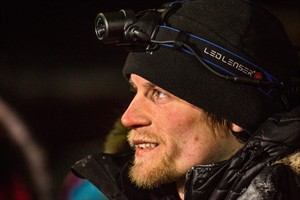
Seavey wins third Iditarod sled dog race in 4 years in event marked by uncertainty
NOME, Alaska – If ever there was uncertainty about the outcome of the world’s most famous sled dog race, it was this year.
Warm weather and a lack of snow in much of Alaska forced organizers of the Iditarod Trail Sled Dog Race to forge an untested route, utilizing the state’s extensive system of frozen rivers.
Many wondered: Would the new trail make the race faster or easier? Would it benefit mushers more accustomed to racing on ice? Or would warm temperatures create new hazards on the rivers?
Dallas Seavey proved the short answer to all of those questions was no Wednesday when he won the race for the third time in four years.
The Alaska musher crossed the finish line in the Bering Sea coastal town of Nome at 4:13 a.m., completing the route in eight days, 8 hours, 13 minutes and 6 seconds. That’s about five hours longer than the record he set in winning the 2014 race.
“Obviously going into this race, the big hubbub was all about the new trail, right?” Seavey told a packed convention hall. Concerns were about the “warm, warm, warm winter” and conditions on the Yukon River.
In fact, a snowmobile sank on thin ice on part of the route mushers were about to take. Some were considering buying rain gear.
But then winter came back to Alaska, and the trails became much more like one would expect for the Iditarod.
“We saw a lot of 40-, 50-below zero, snow,” said Seavey, of Willow. “This was a very tough race. It was not the easy run that a lot of people had anticipated for the Yukon River.”
Seavey’s father, Mitch, finished in second place Wednesday, followed by Aaron Burmeister. Behind them en route to Nome were Jessie Royer and Aliy Zirkle.
Before the race, some wondered if musher Pete Kaiser would have an advantage because of his experience racing on ice. Kaiser won this year’s Kuskokwim 300, which is run entirely on a river. He was in 13th place late Wednesday morning.
Dallas Seavey said that after the route change, the race came down to different mushing styles.
“I think going into this race, we all knew the winner would be who could maximize this new trail and take advantage of that,” he said.
He used two different styles: First, he was more aggressive than usual early on, running near the front of the pack. Then, he let loose what he calls the “monster,” a team that can finish strong, building speed at the end.
Dallas Seavey petted and hugged his dogs after his victory.
“I really do believe this is one of the best teams there’s ever been,” he told reporters and fans at a finish-line ceremony that was live-streamed online. “That may just be overly proud pet parent talking, but they did just win the Iditarod, so that’s some credibility.”
He was presented with $70,000 — $19,600 more than last year — and the keys to a new pickup truck.
Dallas Seavey became the race’s youngest champion in 2012 at age 25. He also won last year in a race he figures he should have placed third in. A freak storm blew out the leaders, and he came across the finish line and didn’t realize he’d won until a cameraman told him.
His father, who lives in Sterling, is a two-time champion. Mitch Seavey won in 2004, and a year after Dallas became the race’s youngest winner, Mitch became its oldest at 53.
A total of 78 mushers began this year’s race March 9 in Fairbanks. Eight racers later scratched, and one was disqualified.
Two dogs have died this year, including one that was hit by a car after getting loose during the ceremonial start. The other dog was on four-time champion Lance Mackey’s team.
No Canadians had finished yet. Rookie musher Jason Campeau of Rocky Mountain House, Alta., was the top Canadian in 19th with Michelle Phillips of Tagish, Yukon, in 20th.
Join the Conversation!
Want to share your thoughts, add context, or connect with others in your community? Create a free account to comment on stories, ask questions, and join meaningful discussions on our new site.













Leave a Reply
You must be logged in to post a comment.